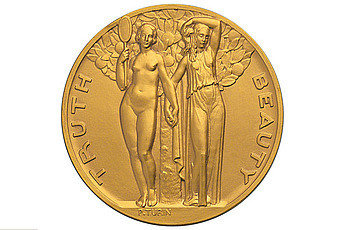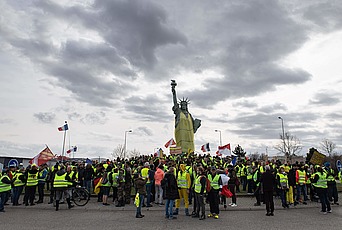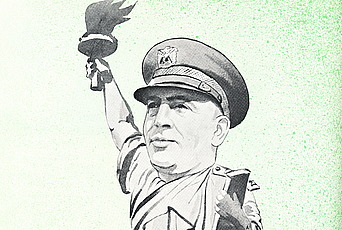Democracy in an Age of Lies

Conventional wisdom today says that the sciences—natural, physical, and even the quantitative social sciences like economics—are especially good for teaching effective truth practices. That is surely right to a degree. But just as much, we might (unfashionably) think about stressing the humanities and, especially, history. Historians of all kinds depend on the existence of facts. Even those most taken with postmodernism do not accept that there is no such thing as an untruth or argue that it is the same to make it all up as to build on verified documentation. Yet historical facts are also the kinds of basic truths that are most easy to manipulate and also often the most politically sensitive and contested. That’s why Truth Commissions have, since the 1980s, been established all over the globe, from postdictatorship Chile and Peru, to postapartheid South Africa, to contemporary American universities grappling with their own racist pasts. The idea behind them all is that, in order to come to terms with prior political violence and to begin the process of finding some basic consensus on which to build, the public needs an opportunity to collect and hear the (often conflicting) evidence of experience, or a kind of lived truth, from all sides, including those that have previously gone unheard. For only with this exposure, no matter how uncomfortable it may be, can a new, truly democratic national or local narrative be forged. There is a lesson here for all efforts to construct accounts of what really happened.
However, that’s not all that history’s good for. For what historians, like their colleagues in literature, art, and philosophy, actually teach—and which is equally vital as a form of training—is not just “what are the facts” and “where do we find them.” They teach interpretation. That means learning how to read and to analyze for meaning. It also means grasping the complexity of any form of truth beyond the most elemental, from how a policy can simultaneously hurt some people and help others, to how complex truths can themselves look so different to two people who hail from the same place. This is ultimately how students learn how to be citizens: people who understand what came before but who can also weigh and consider alternate visions of the future.
Support for a democratic truth regime should thus also lead us to uphold and encourage a tradition of non-violent (but not necessarily “civil” in the sense of polite) protest, a tradition that well predates modern democracy but that had a real revival in the 1960s and into the 1970s across much of the world. Such protests put people in the streets, largely apart from formal institutions and their speech rules, offering critiques but also applying pressure on them to reform their ways. Citizens can and should again join forces to protest against forms of lying and corruption as ethical violations. Citizens should also seize the opportunity to agitate publicly for revised and updated methods and standards of truth determination now that epistemology has reemerged as a critical political battleground. Getting cops to wear cameras that accurately record their interactions with civilians, and especially black civilians, is one recent successful outcome of demonstrations of this sort orchestrated by the grass-roots organization Black Lives Matter. The 2017 March for Science, which took shape in response to the seeming anti-science bent of the early days of the Trump administration, is another. It has now morphed into an organization that supports rallies around the globe designed to convey the message that “science is real” (as protestors in Oklahoma put it) and that we need “evidence-based policy that serves all communities” (according to the organization’s homepage). This is one place where experts and citizens should also find common purpose.
And one could go one step further too. As Mahatma Gandhi made clear in the very different context of late-colonial India, truth, or satya, is ultimately both the condition and the consequence of all politics. Action is political in the positive sense only insofar as it challenges or disturbs ordinary, conventional understandings of the world and ultimately reveals the truth beneath the surface, changing self-conceptions in the process. Truth-seeking and truth-telling are, in other words, inextricably linked to all liberation movements as well.
Yet there is a final risk here. All this pro-truth evangelizing and reinforcement of various democratic traditions might well ultimately be moot if we remain totally divided from one another by every material or psychic measure. Pierre Rosanvallon, writing recently about strategies for combating populism in France, proposed that, in the end, what matters is that people from all walks of life possess a shared language of politics, a common platform for starting a wide-ranging conversation. Hannah Arendt, our intermittent guide through this tricky terrain, would probably have agreed. Neither, though, has much to say about if or how such a thing could be possible in a world defined so thoroughly by economic inequality and stratification as the present one. Could empirically minded, plain-speaking, fact-checking journalists, bulked-up suffrage, court and educational systems, a tradition of street demonstrations, and the development of a new kind of First Amendment jurisprudence that paid more attention to maintaining facticity and reversing silencing techniques be enough to revitalize the democratic take on truth? Could any of the elements of the democratic imaginary, including liberty, equality, and dignity as well as truth become, once again, a widely shared goal? It is hard to say yes to either question as long as people seem to be living in such different worlds, economically and psychologically.
There are, of course, no direct lines between economic hardship and any particular ideological position. Places around the world hard hit by the downturn of 2008 have today placed in power very varied kinds of leaders and parties, alone and in coalitions. Even in the United States, household income, as opposed to geography or cultural identifiers, is generally a poor indicator of voting preferences. That’s because so much of politics today is about questions of identity, lifestyle, and respect, unconnected to pocketbooks (something the very wealthy have, in different ways, encouraged across party lines). Nevertheless, to reach a consensus about what constitutes truth requires agreeing in some minimal way about what reality looks like and, even more, how we can know or represent this reality and why it matters—ethically, epistemologically, politically—how we do so. That’s going to be difficult when not even schools or the military provide for a common experience across economic differences and when money seems to create distinctions in almost every aspect of American life, including perceptions, trust, and the rest. All of which makes one wonder if the preservation of the democratic conception of truth will not ultimately require a considerably more substantive fix.


